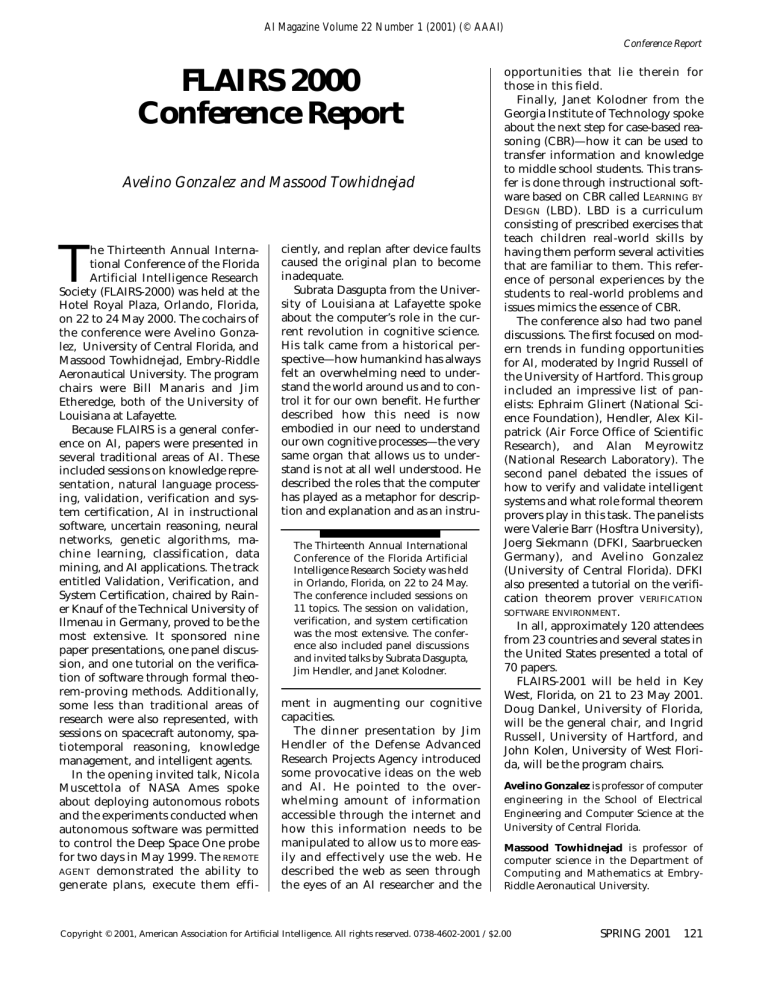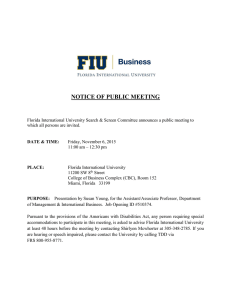
AI Magazine Volume 22 Number 1 (2001) (© AAAI)
Conference Report
FLAIRS 2000
Conference Report
Avelino Gonzalez and Massood Towhidnejad
T
he Thirteenth Annual International Conference of the Florida
Artificial Intelligence Research
Society (FLAIRS-2000) was held at the
Hotel Royal Plaza, Orlando, Florida,
on 22 to 24 May 2000. The cochairs of
the conference were Avelino Gonzalez, University of Central Florida, and
Massood Towhidnejad, Embry-Riddle
Aeronautical University. The program
chairs were Bill Manaris and Jim
Etheredge, both of the University of
Louisiana at Lafayette.
Because FLAIRS is a general conference on AI, papers were presented in
several traditional areas of AI. These
included sessions on knowledge representation, natural language processing, validation, verification and system certification, AI in instructional
software, uncertain reasoning, neural
networks, genetic algorithms, machine learning, classification, data
mining, and AI applications. The track
entitled Validation, Verification, and
System Certification, chaired by Rainer Knauf of the Technical University of
Ilmenau in Germany, proved to be the
most extensive. It sponsored nine
paper presentations, one panel discussion, and one tutorial on the verification of software through formal theorem-proving methods. Additionally,
some less than traditional areas of
research were also represented, with
sessions on spacecraft autonomy, spatiotemporal reasoning, knowledge
management, and intelligent agents.
In the opening invited talk, Nicola
Muscettola of NASA Ames spoke
about deploying autonomous robots
and the experiments conducted when
autonomous software was permitted
to control the Deep Space One probe
for two days in May 1999. The REMOTE
AGENT demonstrated the ability to
generate plans, execute them effi-
ciently, and replan after device faults
caused the original plan to become
inadequate.
Subrata Dasgupta from the University of Louisiana at Lafayette spoke
about the computer’s role in the current revolution in cognitive science.
His talk came from a historical perspective—how humankind has always
felt an overwhelming need to understand the world around us and to control it for our own benefit. He further
described how this need is now
embodied in our need to understand
our own cognitive processes—the very
same organ that allows us to understand is not at all well understood. He
described the roles that the computer
has played as a metaphor for description and explanation and as an instruThe Thirteenth Annual International
Conference of the Florida Artificial
Intelligence Research Society was held
in Orlando, Florida, on 22 to 24 May.
The conference included sessions on
11 topics. The session on validation,
verification, and system certification
was the most extensive. The conference also included panel discussions
and invited talks by Subrata Dasgupta,
Jim Hendler, and Janet Kolodner.
ment in augmenting our cognitive
capacities.
The dinner presentation by Jim
Hendler of the Defense Advanced
Research Projects Agency introduced
some provocative ideas on the web
and AI. He pointed to the overwhelming amount of information
accessible through the internet and
how this information needs to be
manipulated to allow us to more easily and effectively use the web. He
described the web as seen through
the eyes of an AI researcher and the
opportunities that lie therein for
those in this field.
Finally, Janet Kolodner from the
Georgia Institute of Technology spoke
about the next step for case-based reasoning (CBR)—how it can be used to
transfer information and knowledge
to middle school students. This transfer is done through instructional software based on CBR called LEARNING BY
DESIGN (LBD). LBD is a curriculum
consisting of prescribed exercises that
teach children real-world skills by
having them perform several activities
that are familiar to them. This reference of personal experiences by the
students to real-world problems and
issues mimics the essence of CBR.
The conference also had two panel
discussions. The first focused on modern trends in funding opportunities
for AI, moderated by Ingrid Russell of
the University of Hartford. This group
included an impressive list of panelists: Ephraim Glinert (National Science Foundation), Hendler, Alex Kilpatrick (Air Force Office of Scientific
Research), and Alan Meyrowitz
(National Research Laboratory). The
second panel debated the issues of
how to verify and validate intelligent
systems and what role formal theorem
provers play in this task. The panelists
were Valerie Barr (Hosftra University),
Joerg Siekmann (DFKI, Saarbruecken
Germany), and Avelino Gonzalez
(University of Central Florida). DFKI
also presented a tutorial on the verification theorem prover VERIFICATION
SOFTWARE ENVIRONMENT.
In all, approximately 120 attendees
from 23 countries and several states in
the United States presented a total of
70 papers.
FLAIRS-2001 will be held in Key
West, Florida, on 21 to 23 May 2001.
Doug Dankel, University of Florida,
will be the general chair, and Ingrid
Russell, University of Hartford, and
John Kolen, University of West Florida, will be the program chairs.
Avelino Gonzalez is professor of computer
engineering in the School of Electrical
Engineering and Computer Science at the
University of Central Florida.
Massood Towhidnejad is professor of
computer science in the Department of
Computing and Mathematics at EmbryRiddle Aeronautical University.
Copyright © 2001, American Association for Artificial Intelligence. All rights reserved. 0738-4602-2001 / $2.00
SPRING 2001
121
FLAIRS-2000—Orlando, Florida
Proceedings of the Thirteenth International
Florida Artificial Intelligence Research
Society Conference
Edited by Jim Etheredge and Bill Manaris
The Florida AI Research Society Conference was founded in
1987 to promote and advance AI research within the state of
Florida, fostering interaction between researchers at colleges,
universities, and industry. Since 1990, Florida AI Research
Society conferences have been broadened to include participants and papers from across North America and the world.
This year's proceedings covers a wide range of topics, including
applications, computer vision, evolutionary computation,
intelligent agents, knowledge-based systems, learning and AI,
logic and AI, logic programming, natural language processing,
planning, AI applied to spacecraft autonomy, evolutionary
computation, intelligent tutoring systems, knowledge management, neural network applications, parallel and distributed
reasoning, reasoning about function, spatiotemporal reasoning, uncertain reasoning, and verification, validation, and
knowledge-base refinement.
ISBN 1-57735-113-4
400 pp., illus., index, $50.00 softcover
FLAIRS-99—Orlando, Florida
Proceedings of the Twelfth International
Florida Artificial Intelligence Research
Society Conference
Edited by Amruth Kumar and Ingrid Russell
The Florida AI Research Society Conference was founded in
1987 to promote and advance AI research within the state of
Florida, fostering interaction between researchers at colleges,
universities, and industry. Since 1990, Florida AI Research
122
AI MAGAZINE
Society conferences have been broadened to include participants and papers from across North America and the world.
This year's proceedings covers a wide range of topics, including
applications, computer vision, evolutionary computation,
intelligent agents, knowledge-based systems, learning and AI,
logic and AI, logic programming, natural language processing,
planning, AI applied to spacecraft autonomy, evolutionary
computation, intelligent tutoring systems, knowledge management, neural network applications, parallel and distributed
reasoning, reasoning about function, spatiotemporal reasoning, uncertain reasoning, and verification, validation, and
knowledge-base refinement.
ISBN 1-57735-080-4
560 pp., illus., index, $50.00 softcover
FLAIRS-98—Sanibel Island, Florida
Proceedings of the Eleventh International
Florida Artificial Intelligence Research Society
Conference
Edited by Diane J. Cook
Topics in the proceedings include AI applications, AI education, computer vision, evolutionary computation, expert systems, genetic algorithms, intelligent agents, intelligent reasoning, intelligent tutoring systems, knowledge discovery in
databases, knowledge representation, logic, machine learning,
natural language processing, neural networks, reasoning about
function, reinforcement learning, robotics, uncertainty reasoning, and verification and validation.
ISBN 1-57735-051-0
502 pp., index, $50.00 softcover
Published by the AAAI Press
445 Burgess Drive • Menlo Park, California 94025
650-321-4457 (Fax) • 650-328-3123
http://www.aaaipress.org/



